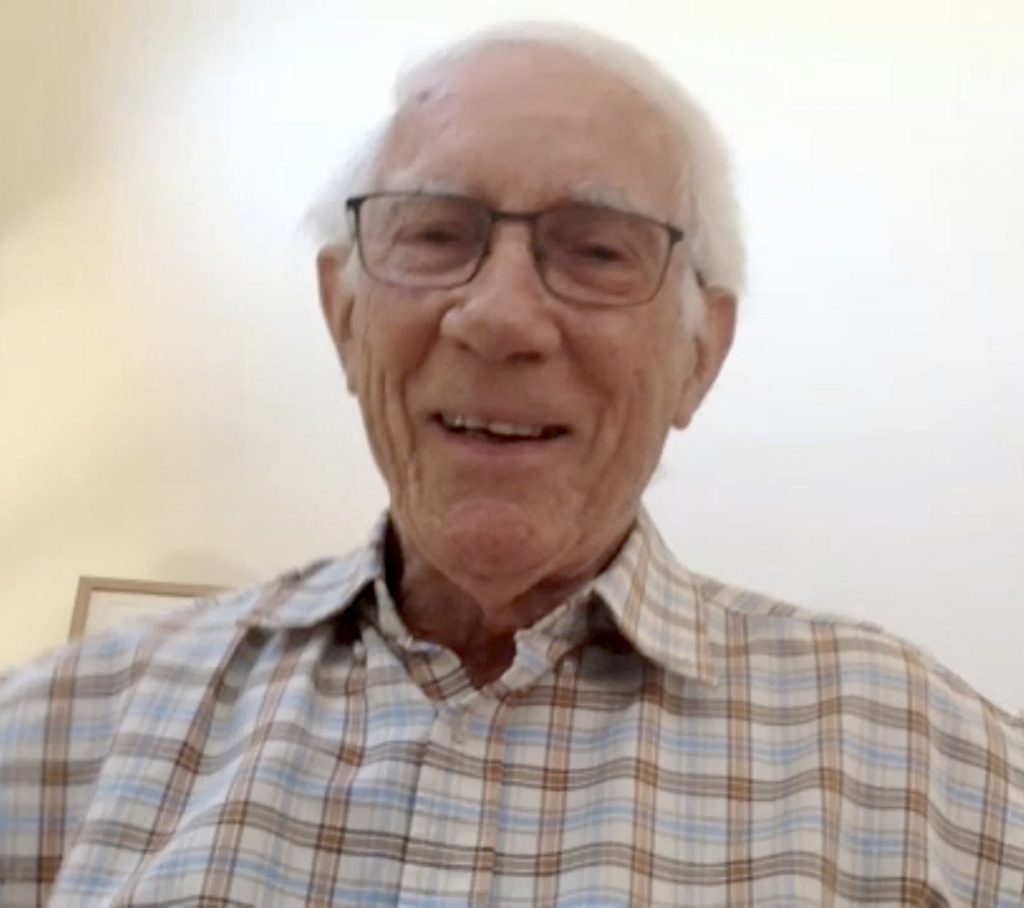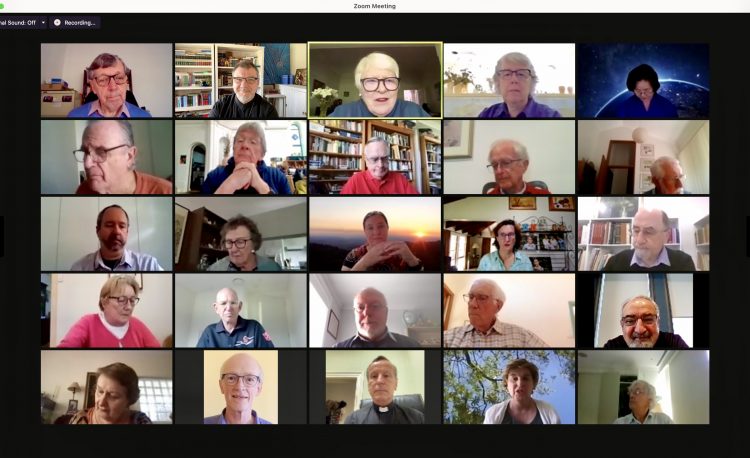 by Doug Hewitt
by Doug Hewitt
Greetings to ecumenical friends, many of whom have been part of my journey over six decades. I speak to you from Awabakal lands in the Hunter and Lake Macquarie region of NSW, and I want to acknowledge the prior owners who have never ceded the land, and still await a Treaty with those who invaded and who now occupy stolen land. We pray for a national response to the cry for Voice. Treaty. Truth.
Thank you for the opportunity to share my reflections on the Theological Reflection Commission’s volume A Celebration of the 25th Anniversary of Ut unum sint, published last year. I speak as a non-theologian, whose calling was in education, concluding with twenty-five years in what is now Australian Catholic University, responsible for leading academic staff development for the final ten years.
This contribution benefits from a perspective of an ecumenical pilgrimage, on which it has been my privilege to journey for the past sixty years, beginning as a student in Armidale in 1959, through chairing the NSW Christian Youth Council in the mid-60s, then my participation in the Australian Council of Churches’ (ACC) national Commission on Overseas Aid and Refugee work (now called Act for Peace) for over forty years, including being its chair for twelve years. In these roles I attended what were then the annual meetings of the ACC at a time when ecumenical commitment by member churches and their leaders were given a high priority. I have gained immense benefits from great mentors over those sixty years, for which I thank God. Those decades concluded from the year 2000 in my work with the NSW Ecumenical Council, firstly as a staff member, and later Hon General Secretary from 2012 to 2014. To all my colleagues I offer appreciation.
My co-presenters in this session have been fellow travellers, with Myung Hwa Park introducing me to her siblings and taking me to the Il Sin Presbyterian hospital in Busan where she was born, when we were attending the World Council of Churches’ (WCC) Tenth Assembly. Claude and I have journeyed together in the struggle for peace with justice for over two decades.
In his introduction to the ebook celebrating the 25th anniversary of the encyclical, Gerard Kelly draws attention to the Decree on Ecumenism of Vatican II and reinforces the idea that Ut unum sint continues the work of the Second Vatican Council. He helpfully reminds us that ecumenical dialogue is not simply an exchange of ideas but in the words of the encyclical is always “an exchange of gifts.” This theme of “unity as a gift” is one that I want to focus on in this presentation.
Prior to the release of Ut unum sint, the Seventh Assembly of the WCC in 1991 produced the Canberra Statement entitled The Unity of the Church as Koinonia: Gift and Calling. It states:
The Holy Spirit as promoter of Koinonia gives to those who are still divided the thirst and hunger for full communion. We remain restless until we grow together, according to the wish and prayer of Christ, that those who believe in Him may be one.
An earlier foundation had been laid by the 1982 Lima document Baptism, Eucharist and Ministry (BEM), which had a significant outcome in this country with the introduction of a common certificate of Baptism, since used by many local churches, even though the other elements of that statement, such as a shared celebration of the Eucharist, still remain elusive. The Ninth Assembly in Porto Allegre received another gift in the text Called to Be the One Church, which inspired progress in several of the bilateral dialogues then taking place in Australia.
The video recording of Doug’s speech and of the conference
Gerard Kelly also refers to other important contributions to the journey towards Christian unity, including the WCC paper The Church: Towards a Common Vision, which was endorsed by the WCC Tenth Assembly in 2013, in Busan. The Theological Reflection Commission was fortunate to host a seminar in Sydney in July 2013 with Dr Tamara Grdzelidze, from the Faith and Order Secretariat of the WCC, who explained the essence of this document, as “a gift for discerning the next steps towards visible unity.”
It has been a great joy to be present at three WCC Assemblies when such significant theological documents have been presented, and opened up for discussion by the delegates. They have all inspired greater efforts from each of us to strive for the gift of unity for which Christ prayed. As an aside, may I say that we miss the frequent visits to our country of ecumenical leaders who have helped to overcome our remoteness.
I have always been inspired by biographies and autobiographies of great leaders (recently reading about the remarkable Angela Merkel, daughter of an East German pastor). One ecumenical prophet who had a great vision of unity was an unassuming cardinal from our shores who was never as well-known as his peers. In his autobiography, My Years in Vatican Service, published in 2009, Australian-born Cardinal Edward Idris Cassidy, President of the Pontifical Council at the time of the release of Ut unum sint, reflects on the achievement of the encyclical and the journey which led to its release. The five years from his commencement in January 1990 to the publication of Ut unum sint in 1995 were extremely busy for Cardinal Cassidy, drafting and redrafting the encyclical. He reminds us that in the encyclical, Pope John Paul II writes that “the ecumenical edifice is built on three pillars: prayer, cooperation and dialogue.” He later writes that
Change of heart and holiness of life, along with public and private prayer for the unity of Christians, should be regarded as the soul of the whole ecumenical movement, and can be rightly called ‘spiritual ecumenism.’ (Ut unum sint 2)
Cassidy further comments in his autobiography “during my years at the Pontifical Council, there was talk from time to time of a ‘winter of ecumenism.’ That was never my experience.” He further states “the eleven years I spent at the Pontifical Council were the best of my life.” This was after a career as a Vatican diplomat for more than thirty years, in a variety of postings around the world, representing the Holy See in countries as diverse as Southern Africa, Latin America and five different Asian countries. Not bad for a boy from Bankstown, who in his teen years accompanied his friend to the Methodist scripture classes at Parramatta High School, because they were not as boring as the Catholic ones!
In retirement in Newcastle, until his death last year at 96, he often reminisced about his life’s experiences. He welcomed a ride home after ecumenical gatherings, and frequently spoke about his joy of meeting representatives from many churches when they visited the Vatican, and his delight of staying with generous hosts at places like Lambeth Palace with Archbishop George Carey and his successors, as well as once attending an ashes cricket test at Nottingham with Geoffrey Wainwright, from the Methodist World Council. He confessed that as expected they cheered for different teams!
In My Years in Vatican Service, Cardinal Cassidy writes that although it is true that our divisions are the result of human weakness and sin, and that God will not bring about unity without our efforts, that strong desire for unity will not be achieved by our own efforts alone, but is a gift from God. He writes of a period early in his time at the Vatican, when there seemed to be a standstill in relations with other churches, and he had the task of preparing a homily on the Gospel account of the disciples fishing all night without success. We recall that Jesus appeared and instructed Peter to “put out into deep water and let down your nets for a catch.” Despite Peter’s protestations that they had fished all night and caught nothing, Jesus was insistent. So Peter reluctantly followed the command of the master, and we know the result. Cassidy writes:
I suddenly realised that what the Lord was asking me to do was to let down the nets, ….. and leave the rest to the Lord. From then on I was able to carry on the task entrusted to me without being overly concerned about the results. Of course, I was eager to have a great ‘catch,’ but that was the Lord’s to grant in due time. (126).
In conclusion, Cassidy paints a positive future for the ecumenical endeavour, which he certainly conveyed to us in Newcastle, when he spoke publicly on occasions such as the service for the Week of Prayer for Christian Unity. He always remained positive about the gift that unity offers to us all.
May I take a minute to urge that serious attention be given to “receptive ecumenism,” a term which I am sure is familiar to you all. Following a visit to Australia for two months in 2012 by Professor Paul Murray of Durham, the TRC of NSWEC published in 2013 the excellent study guide The Gift of Each Other: Learning from Other Christians. This book was launched at Polding Centre by the two Archbishops of Sydney, Cardinal George Pell and Dr Glenn Davies, in a mutually collegial event. At the launch Dr Gideon Goosen, the editor, described how people from across the churches were invited to tell their own stories of what they had learned from members of churches other than their own. These accounts are used to provoke questions for group discussion on the lessons we can take for our own local ecumenical dialogues. If you don’t have a copy, please ensure that you contact the NSWEC to order one or more. It is an excellent stimulus for local ecumenical study, when we are able to enjoy that luxury again.
Finally, as the World Council of Churches prepares for its Eleventh Assembly in Karlsruhe Germany in 2022, it is important to keep pace with the stimulating theological writing on unity in journals such as The Ecumenical Review, from the World Council of Churches. My recent reading has focused on articles such as that by Rev Dr Susan Durber, the current Moderator of the Faith and Order Commission of the WCC. The theme of the coming Assembly is “Christ’s Love Moves the World to Reconciliation and Unity,” the first time Durber points out, that that the theme puts Love at the heart of an Assembly. It will take another paper to tease out the implications that this decision has for the emphasis on the life at the coming Assembly, and even more challenging for the Faith and Order Commission to grapple with this theme’s implications for its work. For example, Durber asks whether in contrast with the traditional emphasis on the intellectual pursuit of rational thought in the Commission which she chairs, is it possible for love to sit easily with the maintenance of order within the church. Can this be a turning point in the work of the ecumenical movement?
The Faith and Order Commission has been hosting a series of webinars on Koinonia and Visible Unity, the most recent last week, with speakers giving different perspectives on the responses from WCC member churches to the document The Church: Towards a Common Vision. Dr Durber has been joined by fellow members of the Commission from Canada and the United States in assessing the new reality, of hearing fewer voices from the Global North than from emerging vibrant churches in the Global South. Dr John Gibault declared that the future of the gift of unity lies in grappling with the impact of poverty, racism and climate change on the survival of humanity.
Dr Durber’s conclusion challenges us to transform our usual approach to theological study. She asks:
What could it mean to discover anew an ecumenical movement that is founded on love, profoundly moved and inspired by love, and unafraid to talk about love? What could it mean to renew ecumenism so that it finds new shapes, forms and styles in more holistic ways, embracing all of body, mind and heart?
Durber takes heart that at her ordination into the United Reformed Church in the UK she had to promise “to cherish love towards all other churches, and to endeavour always to build up the one holy, catholic and apostolic Church.” I am encouraged that such thinking is now at the forefront of the leadership in the WCC’s theological study. If we can capture this thinking in our Australian churches then the hope enshrined in Ut unum sint may be realised.
Before retirement, Doug Hewitt was an Associate Professor at the Australian Catholic University. He is a veteran of the ecumenical movement in New South Wales, still very active in the field.
Acknowledgment: This paper was presented at the online conference “What Does It Mean to Be Ecumenical?” organised by the NSWEC’s Theological Reflection Commission, 9 October 2021. For details about this conference, see this news item.
21 October 2021 © AIOCS
AIOCS LTD is a not-for-profit charitable organisation that promotes the study of Orthodox Christianity, Eastern and Oriental, in Australia
For donations, please go to https://www.paypal.com/paypalme/aiocsnet or contact us at info@aiocs.net


